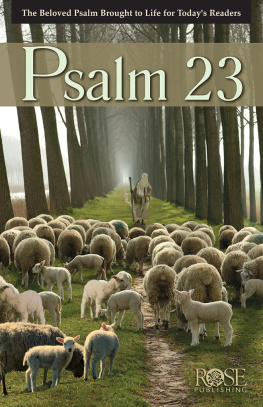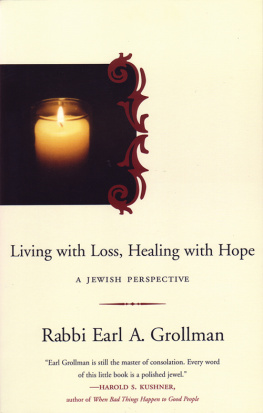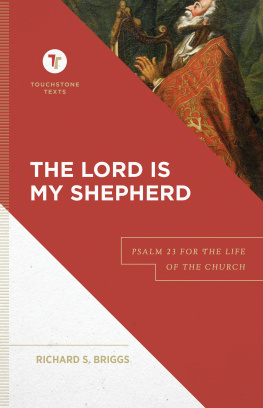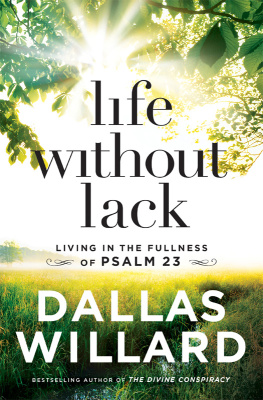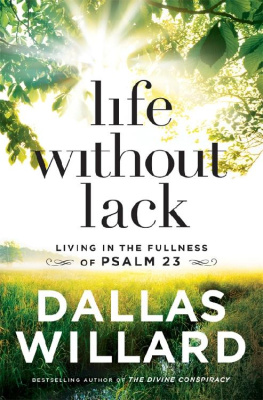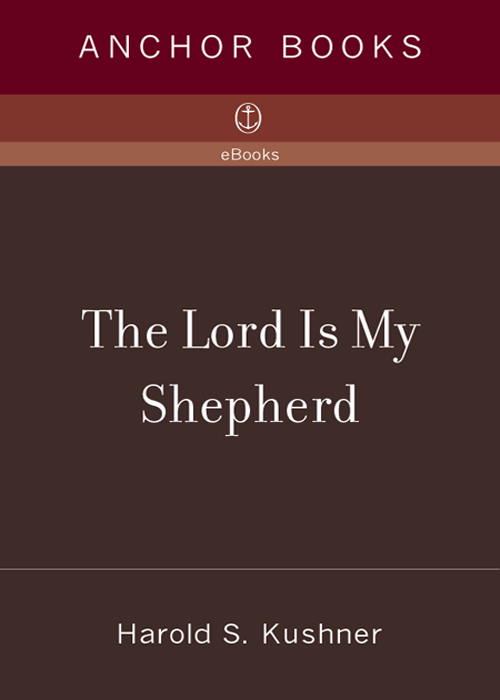
HAROLD S. KUSHNER
The Lord
Is My Shepherd
HEALING WISDOM
OF THE TWENTY-THIRD PSALM

Alfred A. Knopf New York 2003
Contents
For Suzette
For she has been with me
Through so many peaks and valleys.
THE TWENTY-THIRD PSALM
A psalm of David:
The Lord is my shepherd; I shall not want.
He makes me to lie down in green pastures,
He leads me beside the still waters.
He restores my soul.
He guides me in straight paths for His Names sake.
Yea, though I walk through the valley of the shadow
of death,
I will fear no evil
For Thou art with me.
Thy rod and Thy staff, they comfort me.
Thou preparest a table before me in the presence of
mine enemies.
Thou anointest my head with oil,
My cup runneth over.
Surely goodness and mercy shall follow me all the
days of my life,
And I shall dwell in the House of the Lord forever.
First Words
I have been thinking about the ideas in this book for more than forty years, since I was first ordained as a rabbi. Every time I would read the Twenty-third Psalm at a funeral or memorial service, or at the bedside of an ailing congregant, I would be struck by its power to comfort the grieving and calm the fearful. But the real impetus for this book came in the wake of the terrible events of September 11, 2001. In the days following the attacks, people on the street and television interviewers would ask me, Where was God? How could God let this happen? I found myself responding, Gods promise was never that life would be fair. Gods promise was that, when we had to confront the unfairness of life, we would not have to do it alone for He would be with us. And I realized I had found that answer in the Twenty-third Psalm.
I have been fortunate, in writing this book, to benefit from the guidance of two very capable editors. This is my sixth book written with the help of James H. Silberman. His is a distinguished name in the publishing industry, and he has been an unfailing source of encouragement and direction. It is my second book shared with Jonathan Segal of Alfred A. Knopf. Jonathan is a marvelously skilled editor whose suggestions helped give the book the focus and direction it needed. I am grateful to both of them.
My longtime agent, Peter Ginsberg, played a key role as matchmaker for this book, and I thank him for it.
But mostly I am grateful to Suzette, my wife of forty-three years, for her patience and encouragement through all the months it took me to bring forth this book. I could not have done it without her.
CHAPTER ONE
A Psalm of David
Can fifteen beautiful lines from a single page of the Bible change your life? I believe they can, if you are willing to open your heart to their magic. Listen closely to them, read them with an open mind and an open heart, and you will find the answers to questions you are asking, questions about yourself, the people around you, and the world in which you and they live.
I would guess that there is one, and only one, chapter of the Bible that most people in the English-speaking world know by heart. We may remember a lot of stories about Adam and Eve, Noah, Joseph, and Moses. We may be able to recite the Ten Commandments, parts of the Sermon on the Mount, and other passages that have entered into our literature. But when it comes to an entire chapter, I suspect that the only one we remember completely is chapter twenty-three of the Book of Psalms, the Twenty-third Psalm, The Lord is my shepherd, I shall not want....
Even if you cannot recite the entire psalm perfectly, you know it well enough to say it along with a congregation, the way many of us sing along with The Star-Spangled Banner at a baseball game. We are so familiar with the Twenty-third Psalm that when a new translation of the Bible comes along, using archaeological and linguistic evidence to help us understand more accurately what the original Hebrew and Greek meant to say, we are uncomfortable with the improvements. We welcome the rewording of the stories, stripped of the Elizabethan vocabulary of the four-hundred-year-old King James translation (done in the time of Shakespeare). We dont miss the use of begat and wouldst and thee and thou. But when it comes to our favorite psalm, we crave familiarity more than accuracy.
Why do we love this psalm so much, more than any of the other 149 psalms in the Bible? Why do we reach for it at moments of personal distress, cherishing its recitation at funerals and memorial services? It is a beautiful literary creation, but the anthologies are full of beautiful writings, and they dont capture our hearts as the Twenty-third Psalm does. In just a few lines, it conveys the distilled wisdom of generations, offering us a way of seeing the world that renders it less frightening, teaching us to deal with the loss of people we love and with conflict with people who dont like us or who treat us badly. It shows us how to recognize the presence of God at times and in places where we might think God was absent or when we might be so distracted by our own concerns that we would overlook Gods presence. It has the power to teach us to think differently and, as a result, to act differently.
Science, Albert Einstein once said, can tell us a lot about the universehow old it is, how vast it is, what laws of physics control it. But he went on to say that science is powerless to answer the most important question of all: Is the universe a friendly place, supportive of human hopes and aspirations?
The Twenty-third Psalm, with its image of the Lord as our shepherd, responds to that concern. It gives us an answer, not in theological language but in beautifully crafted words and skillfully chosen images, and we respond to its honesty and optimism as much as to the beauty of its language. It comforts us with its familiar words and images, but its message goes well beyond comfort. It does not simply offer us the prospect of a better, safer world beyond this one. It teaches us to look at the world we live in clearly and without illusions, but at the same time to see it as a world in which we can live courageously, doing good for ourselves and others. Our world may not be a perfect world, but it is Gods world, and that makes all the difference. Yes, the world may be dangerous, it admits, but God is there to take care of us, to help us, even as a shepherd cares for his sheep in a world of dangerous predators and threats of accident. The world may be a frightening place, but it becomes less frightening when we know that God is here with us. As one writer has put it, sometimes God calms the storm, but sometimes God lets the storm rage and calms the frightened child.
The psalm does not deny the shattering reality of death and loss, nor does it minimize how painful death and loss can be to us. It never asks us to pretend, as some religious teachings do, that death does not change things, that moving from life to death is no different than moving from New York to Chicago. It acknowledges the emotional darkness we find ourselves in when a loved one is dying or has died, the valley of the shadow of death. But instead of cursing a God who permits our loved ones to die, it introduces us to a God who is with us in our pain, and who leads us through the dark valley back into the light. It summons us to live bravely, to go forward with our lives in the confidence that we are not alone.
Next page

